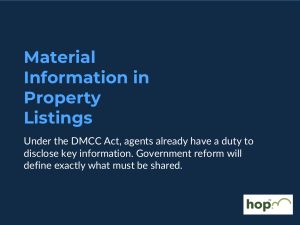Over the last 18 months, material information has become a hot topic in property circles. But while much of the industry still treats it as a compliance burden, I believe we’re missing the bigger picture. Material information isn’t just about ticking a regulatory box—it’s one of the clearest opportunities we have to improve the home-moving process for everyone involved.
A Shift in Mindset
Yes, the regulations have teeth. The DMCC Act 2024 and the Competition and Markets Authority’s new enforcement powers have raised the stakes. Non-compliance isn’t theoretical anymore—it’s actionable, and penalties are significant.
But focusing solely on the risk of fines misses the real value. The agents and legal teams who have embraced material information early aren’t just avoiding enforcement—they’re reaping the rewards of smoother transactions, faster completions, and happier clients.
What We’re Seeing at the Coalface
At Homeowner’s Passport, we work closely with agents and conveyancers across the UK. Our data shows a clear divide: roughly 50% of estate agents are actively engaging with material information. The ones that do are seeing measurable benefits:
- Up to 35% reduction in transaction timelines
- Fall-through rates reduced by over 40%
- More confident buyers and fewer last-minute surprises
That’s not just better compliance. That’s better business.
From Compliance Burden to Commercial Advantage
When agents embed material information early—especially when it’s gathered to a conveyancing-grade standard—it transforms the transaction:
- Properties are “market ready” and “contract ready” earlier.
- Lawyers can begin work sooner, using reliable, pre-verified data.
- Complexities (like restrictive covenants or lease issues) are addressed proactively, not reactively.
All of this leads to faster sales, fewer dropouts, and a better experience for buyers and sellers alike. For professionals, it means improved pipeline management, more trust from clients, and stronger working relationships across the chain.
The Tools Now Exist
Until recently, gathering and verifying this kind of data was a manual slog. But we now have the digital infrastructure to do this quickly, accurately, and affordably.
- Agents can use tools like Homeowner’s Passport to automate data collection.
- Lawyers can verify title information, draft contracts, and even spot title defects before an offer is accepted.
- And we can all work from a shared source of truth, not from scratch every time.
Looking Ahead
Yes, guidance may shift, and yes, we’ll see more from the CMA. But the direction of travel is clear: upfront, accurate information is the future. For the firms who embrace it, that future looks faster, fairer, and far more efficient.
It’s time we stop treating material information as a regulatory chore—and start using it as the strategic asset it really is.



